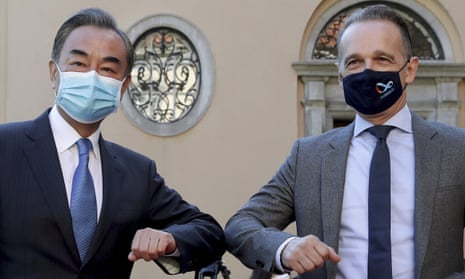The Chinese foreign minister Wang Yi did not exactly end his week-long European tour with his tail between his legs but he may have been chastened if he ever believed Beijing could simply win over Europe by pointing to the extremist cold war rhetoric of Europe’s natural ally America.
The five-nation tour surely marked the end of an era where China can any longer get away with simple homilies on win-win solutions, multilateralism and non-interference in another’s internal affairs. Pointing to Donald Trump is also no longer enough to win European friends.
Instead at every stop on his tour Wang was reminded by the presence of Hong Kong pro-democracy activists that China may now pay a political price for imposing new security laws in Hong Kong and suspending elections there, and insisting that detained Uighur Muslims are simply going through some beneficial work experience training.
The question is whether that political price will transform into an economic price.
Nathan Law, the self-exiled Hong Kong activist, travelled to both Italy and Germany to put a human face to the suppression in Hong Kong, and to argue that the policy of engagement had failed and needed revising.
Sometimes lengthy press encounters in France, Germany and Norway did not go the foreign minister’s way, leading him to threaten Norway if the independent Nobel peace jury gave a prize to Chinese human rights activists. In Berlin, the most important leg of the visit due to Germany’s leadership role, the minister had to defend himself after threatening the Czechs with an unspecified high price after the speaker of the Czech senate “shortsightedly” visited Taiwan.
Heiko Maas, the German foreign minister, ran through the card with Wang, saying such threats were not appropriate, calling for the Hong Kong legislative elections “quickly and unhindered” and urging the withdrawal of the new security law.
A reassessment of China is having wider security implications. Germany following France’s lead is due shortly to publish a strategy for the Indo-Pacific region that will reinforce Berlin’s defence ties with India, Japan and Australia. Maas knows he is hardly working against the tide of public opinion. Polls show the more the public examine China’s response to Covid-19 the less they like it.
But the foreign minister will be pleased that no new specific sanctions were spelled out, and Huawei remains in contention for providing Germany’s 5G network. He will also have noted China’s continued pulling power. He was greeted by the president of France, the prime minister of Norway, and spoke by phone with the Italian prime minister. Only in the Netherlands and Germany did he have to settle for a meeting with his opposite number. Overall, Wang was hardly feted but nor was he shunned.
He will have noted that the European Union’s patience is wearing thin with the unfulfilled promise of equal access to China’s market, and an end to Chinese state subsidies. Talks over a new investment agreement remain deadlocked and will be raised again at an EU-China virtual summit on 17 September. Inside the commission there is a growing awareness that connectivity with China may have gone too far.
The pandemic has above all revealed an over-dependence on external supplies, not just of health products but also strategic minerals such as lithium and cobalt in which China specialises. The talk in Brussels may not be US-style decoupling, but diversification is a goal.
China’s betting will probably remain that the EU needs China more than China needs the EU, but the foreign minister, an astute diplomat, will have left with much to reassess.
